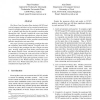561 search results - page 9 / 113 » Alias Analysis of Executable Code |
145
click to vote
CF
2006
ACM
15 years 4 months ago
2006
ACM
The growing speed gap between memory and processor makes an efficient use of the cache ever more important to reach high performance. One of the most important ways to improve cac...
135
click to vote
IPPS
1999
IEEE
15 years 6 months ago
1999
IEEE
Both inherently sequential code and limitations of analysis techniques prevent full parallelization of many applications by parallelizing compilers. Amdahl's Law tells us tha...
137
Voted
JSA
2000
15 years 1 months ago
2000
In this article, the problem of finding a tight estimate on the worst-case execution time (WCET) of a real-time program is addressed. The analysis is focused on straight-line code...
127
click to vote
ACMSE
2006
ACM
15 years 8 months ago
2006
ACM
Software researchers have already developed static code security checkers to parse through and scan source code files, looking for security vulnerabilities [8, 9]. What about exec...
117
click to vote
WORDS
2002
IEEE
15 years 7 months ago
2002
IEEE
The Worst-Case Execution-Time Analysis (WCET Analysis) of program code that is to be executed on modern processors is a highly complex task. First, it involves path analysis, to i...

